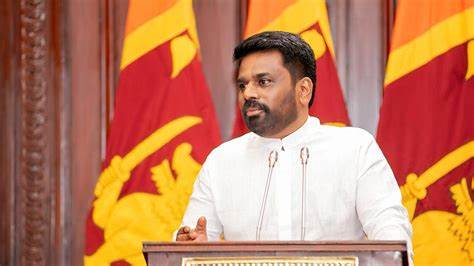
Wide Angle captures AKD Government’s under Fire amid Confusion
- CNL Reporter
- May 25, 2025
- Weekly Political Review
- President Anura Kumara Dissanayake
- 0 Comments
.Weekly Political Review
Ruling NPP faces mounting scrutiny while trying to assert control. From missteps
By Rohan Jith
Organisational Strength vs. Governance Stumbles
The National People’s Power (NPP), led by President Anura Kumara Dissanayake (AKD), came to power riding high on an exceptional grassroots campaign that outperformed rivals. Its early advantage was a disciplined organisational structure and strategic communication, particularly on social media. However, since assuming office, the same government has struggled with coherence and coordination, especially in communication.
War Heroes’ Day Controversy
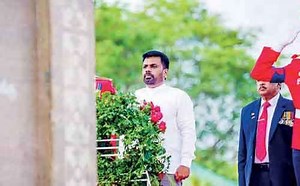
A major setback came during the 16th National War Heroes’ Day. A Defence Ministry briefing had stated that Deputy Defence Minister Aruna Jayasekara would represent the President, prompting public backlash and opposition criticism.
The President, initially believed to be absent, later confirmed attendance through a last-minute update. Despite AKD attending and delivering a unifying speech, the damage was done. The confusion, compounded by unclear invitations and contradictory official statements, raised serious concerns about the government’s communication machinery.
AKD’s Peace Message
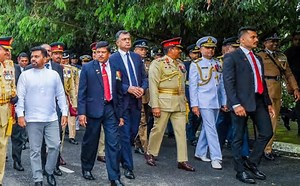
At the event, AKD highlighted the tragedy of war and called for lasting unity among all communities. He stressed the importance of ensuring peace and reconciliation, warning against rekindling ethnic divisions. However, the President’s remarks, though statesmanlike, failed to silence critics who viewed his initial absence as disrespectful.
Double Standards in Attendance Criticism
Observers noted that former President Ranil Wickremesinghe had also skipped similar events, with then PM Dinesh Gunawardena representing him, without triggering the same level of outrage. This selective criticism suggested political bias, especially from nationalist groups.
Rajapaksas Re-emerge
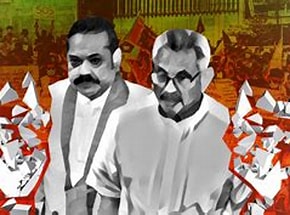
Former Presidents Mahinda and Gotabaya Rajapaksa made a rare public appearance at an SLPP-organised Heroes’ Day commemoration. Mahinda reiterated that the war was against terrorism, not any ethnic group—an apparent response to AKD’s reconciliatory tone.
Canada, Tamil Diaspora Demand Accountability
Meanwhile, international attention was drawn to the Sri Lankan conflict’s legacy. Canadian PM Mark Carney, marking Tamil Genocide Remembrance Day, urged continued international accountability efforts. Protests in Canada, the UK, and Australia echoed similar sentiments, demanding justice for Tamil victims of war, especially the 2009 Mullivaikkal massacre.
Struggle for Local Power
Back home, a race is on to secure control of Local Government (LG) bodies ahead of the June 2 deadline. The NPP has faced challenges in converting electoral victories into council majorities, leading to unusual political alliances and intense negotiations. The battle for LG control has become a central focus of domestic politics.
Economic Pressures Mount

Despite political wrangling, Sri Lanka continues to grapple with a fragile economy. Key issues include securing the next IMF tranche, managing U.S. trade talks, dealing with food shortages, and responding to rising gun violence. These challenges are testing the new government’s ability to transition from rhetoric to results.
US Tariff Negotiations and Uncertainty
Sri Lanka is locked in trade negotiations with the U.S. amid proposed reciprocal tariffs initiated during Donald Trump’s presidency. A second delegation is set to visit Washington, DC, but Trump’s recent remarks suggest that trade deals will be dictated by U.S. terms, possibly delaying a resolution for Sri Lanka.
Germany Visit amid Foreign Policy Shifts
President AKD is set to visit Germany on June 10—his fifth foreign trip since taking office. However, the visit is expected to include discussions on the Prevention of Terrorism Act (PTA), which successive Sri Lankan governments, including the NPP, have pledged to repeal. Germany’s focus on human rights may put AKD in a delicate diplomatic position.
Criminal-Political Links Spark Outrage
A shocking revelation came from Public Security Minister Ananda Wijepala, who stated in Parliament that the State Intelligence Service (SIS) had found links between major political party members—including those from the SLPP, SJB, and UNP—and 10 organised criminal gangs. The statement sparked heated exchanges, with Opposition MPs demanding names and increased security for lawmakers.
Security Concerns and Parliamentary Clashes
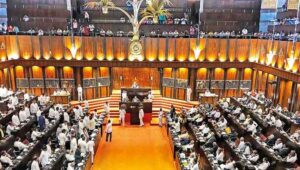
Opposition MP Dayasiri Jayasekara demanded better VIP security after the revelations, claiming threats to MPs were being ignored. Leader of the House Bimal Rathnayake countered, accusing the Opposition of wasting time in Parliament instead of cooperating to ensure national safety.
Conclusion
The NPP-led government, once admired for its electoral discipline, now faces critical tests in governance, diplomacy, and law enforcement. Confusion over major state events, diplomatic scrutiny abroad, and rising insecurity at home paint a picture of a leadership grappling with the weight of power. As the honeymoon period fades, AKD’s administration must shift from reactive to proactive governance if it hopes to retain public trust and meet the challenges of a recovering nation.

